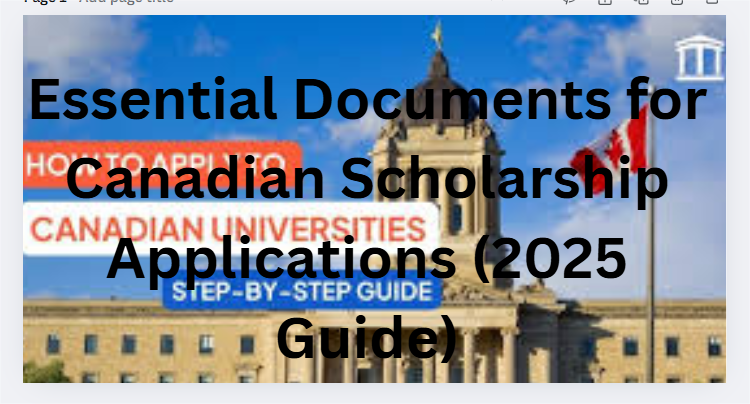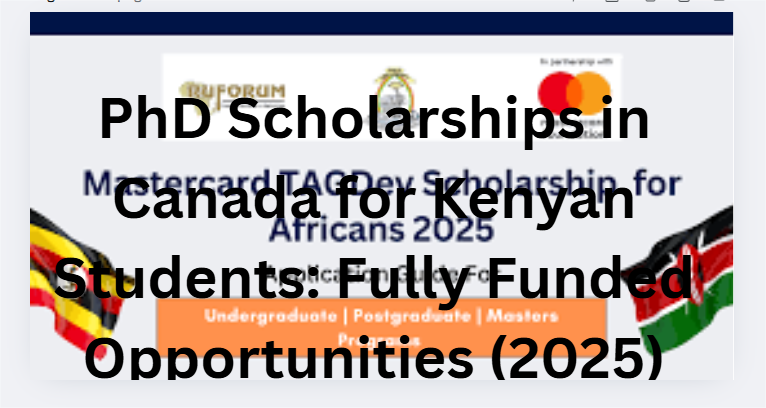Canadian Scholarships for Kenyan Students: Your Complete Guide to Success
July 10, 2025 | by eguideshub

For ambitious Kenyan students, Canada offers world-class education, vibrant multicultural cities, and excellent post-graduate opportunities. But the cost can be daunting. The good news? Numerous scholarships can turn your Canadian dream into reality. This guide reveals everything you need to know—from top scholarships to insider application tips.
Why Canada? Benefits for Kenyan Students
Canada stands out as a top study destination because of:
- Globally recognized degrees from institutions like University of Toronto, UBC, and McGill
- Work opportunities through the Post-Graduation Work Permit (PGWP)
- Affordable tuition compared to the US and UK
- Pathway to permanent residency for skilled graduates
- Safe, welcoming communities with large Kenyan diasporas
But tuition and living costs can still add up. That’s where scholarships come in.
Top Canadian Scholarships for Kenyan Students
1. Vanier Canada Graduate Scholarships
- For: PhD students in health, engineering, social sciences
- Funding: $50,000 per year for 3 years
- Deadline: November (annual)
2. University of Toronto Lester B. Pearson Scholarship
- For: Exceptional undergraduates
- Funding: Full tuition, books, residence
- Deadline: January
3. University of Alberta International Scholarships
- For: Undergrad & grad students
- Funding: Up to $120,000 over 4 years
- Deadline: Varies by program
4. Canada-ASEAN Scholarships (Includes Kenya)
- For: Short-term exchanges, research
- Funding: $10,000+ for 4-6 months
- Deadline: March
5. Mastercard Foundation Scholars Program
- For: African undergrads & graduates
- Funding: Full tuition, living stipend, travel
- Deadline: Varies by university
How to Apply Successfully (Tips from Winners)
Start Early
Many scholarships require applications 12+ months in advance.
Choose the Right Scholarship
- Undergrad? Focus on university entrance awards.
- Master’s/PhD? Target research grants like Vanier.
Perfect Your Application
- Personal Statement: Show passion, goals, and why you deserve funding.
- Recommendation Letters: Pick professors who know you well.
- Academic Records: Ensure transcripts are certified.
Meet English Requirements
Most need IELTS (6.5+) or TOEFL. Some accept:
- Previous education in English (MOI letter)
- Duolingo English Test
Apply to Multiple Scholarships
Don’t rely on one—increase your odds with several applications.
What If You Don’t Get a Full Scholarship?
Partial Funding Options
- University bursaries (need-based aid)
- Teaching/research assistantships
- External sponsors (banks, NGOs)
Work While Studying
- On-campus jobs (no work permit needed)
- Off-campus (20 hrs/week during school)
Final Advice: Avoid Common Mistakes
🚫 Missing deadlines – Mark your calendar!
🚫 Generic applications – Tailor each submission.
🚫 Weak references – Choose recommenders carefully.
Next Steps for Kenyan Students
- Research – Visit university financial aid pages.
- Prepare – Gather documents early.
- Apply – Submit before deadlines.
Essential Documents for Canadian Scholarship Applications (2025 Guide)

For Kenyan students applying to Canadian undergraduate scholarships, having the right documents prepared is crucial for success. Here’s a comprehensive checklist of what you’ll need:
Core Application Documents
- Academic Records
- Certified KCSE certificate and transcript (minimum B+ average)
- Secondary school leaving certificate
- Any additional diplomas or certificates
- Proof of English Proficiency
- IELTS (minimum 6.5 overall) or TOEFL scores
- Some universities accept:
- Duolingo English Test
- Medium of Instruction letter (if previous education was in English)
- Identification Documents
- Valid Kenyan passport (with at least 6 months validity)
- National ID or birth certificate
- Passport-sized photographs
Scholarship-Specific Requirements
- Application Essays
- Statement of Purpose (500-1000 words)
- Personal biography
- Study objectives/research proposal (for certain programs)
- Recommendation Letters
- Typically 2-3 letters required
- Best from:
- School principals/headteachers
- Subject teachers
- Community leaders (for leadership scholarships)
- Financial Documents
- Bank statements (for need-based scholarships)
- Sponsorship letters (if applicable)
- Income verification documents
Additional Supporting Materials
- Extracurricular Evidence
- Certificates of participation/achievement
- Leadership records
- Volunteer experience documentation
- Standardized Test Scores (where required)
- SAT/ACT results (for some US-Canada joint programs)
- Advanced Placement (AP) exam scores
- Creative Submissions (for special scholarships)
- Portfolios (art/design applicants)
- Writing samples
- Research abstracts
Important Notes:
- All documents must be certified/notarized copies
- Official translations required for non-English documents
- Digital copies should be high-quality scans
- Keep multiple copies of everything
- Check specific requirements for each scholarship
Document Preparation Timeline
Start gathering these documents at least 6 months before application deadlines. Allow extra time for:
- Obtaining certified copies
- Scheduling language tests
- Securing recommendation letters
- Translating documents (if needed)
How to Write a Winning Statement of Purpose for Canadian Scholarships
A compelling Statement of Purpose (SOP) can make or break your scholarship application. Unlike a resume, your SOP tells your unique story—why you deserve funding, what drives you, and how you’ll contribute to Canada’s academic community.
Here’s how to craft an SOP that stands out.
Key Elements of a Strong SOP
1. Clear Introduction (First Impression Matters)
- Start with a hook—a personal anecdote, a defining moment, or a powerful statement about your goals.
- Briefly state your field of interest and why you’re passionate about it.
❌ Weak: “I want to study Computer Science in Canada because it’s a good course.”
✅ Strong: “At 15, I built a mobile app to help small traders in Nairobi track inventory—this sparked my passion for software solutions that empower communities.”
2. Academic Background & Achievements
- Highlight relevant coursework, projects, and grades (especially in your field).
- Mention awards, research, or leadership roles that demonstrate your potential.
💡 Example:
“My KCSE score of A- in Math and Physics, combined with my coding bootcamp certification, reflects my readiness for Computer Engineering at the University of Waterloo.”
3. Why Canada? (Show You’ve Done Your Research)
- Name specific professors, labs, or courses that align with your goals.
- Explain how Canada’s education system suits you better than others.
PhD Scholarships in Canada for Kenyan Students: Fully Funded Opportunities (2025)

Why Pursue a PhD in Canada?
Canada offers Kenyan doctoral students:
- World-class research facilities at top-ranked universities
- Generous funding packages covering tuition + living expenses
- Post-study work opportunities (PGWP visa)
- Pathway to permanent residency for graduates
- Multicultural environment with vibrant Kenyan communities
Top Fully Funded PhD Scholarships
1. Vanier Canada Graduate Scholarships
- Value: $50,000/year for 3 years
- Fields: Health, Natural Sciences, Engineering, Social Sciences
- Deadline: November 2024
- Unique Requirement: Demonstrated leadership skills
2. University of Toronto Doctoral Fellowships
- Value: Up to $45,000/year
- Duration: 4-5 years
- Perk: Automatic consideration upon admission
3. Pierre Elliott Trudeau Foundation Doctoral Scholarships
- Value: $40,000/year for 3 years
- Focus: Social sciences & humanities with public engagement
- Special: Includes leadership training
4. University of British Columbia Four Year Fellowship
- Value: $30,000+/year
- Coverage: Tuition + living expenses
- Eligibility: International PhD students
5. McGill University Graduate Funding
- Minimum Support: $22,000/year
- Additional: Conference travel grants
- Note: Most departments guarantee funding
Eligibility Criteria for Kenyan Applicants
- Academic: First-class or strong second-class upper Master’s degree
- Research Proposal: Clear, innovative, and feasible
- Supervisor Contact: Must secure commitment from Canadian professor
- Language: IELTS 7.0+ or equivalent (some waivers available)
Application Timeline
- 12-18 months before: Identify potential supervisors
- 10-12 months before: Prepare research proposal
- 8-10 months before: Contact professors (send CV + research synopsis)
- 6-8 months before: Apply for admission + scholarships
- 3-6 months before: Submit visa application
Success Tips from Kenyan Awardees
- Supervisor First: Secure commitment before formal application
- Tailor Proposals: Align with department’s research strengths
- Funding Layers: Combine multiple smaller awards
- Network: Connect with Kenyan PhD students in Canada
Alternative Funding Sources
- Research Assistantships: $15,000-$25,000/year
- Teaching Fellowships: $10,000-$18,000/year
- External Grants: DAAD, Commonwealth, African Union funding
Final Thoughts: Your Canadian Scholarship Journey Starts Now
For Kenyan students, Canada isn’t just a dream—it’s an achievable goal with the right scholarship strategy. Remember:
✅ Opportunities exist – From undergraduate to PhD levels, funding is available
✅ Preparation matters – Strong applications take time and effort
✅ Persistence pays – Many successful applicants applied multiple times
RELATED POSTS
View all


